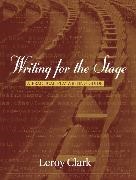Share
Fr. 64.10
Leroy Clark
Writing for the Stage
English · Paperback / Softback
Shipping usually within 3 to 5 weeks
Description
With skills-focused exercises ranging from beginning to advanced levels, Writing for the Stage takes students through the creative process to develop a stageworthy script.
The purpose of Writing for the Stage: A Practical Playwriting Guide is to provide students with a variety of exercises to help develop writing skills for the stage that eventually lead to the creation of a script. Although there is no magic formula-no right or wrong way to create a dramatic work-there are still traditional expectations for plot, conflict, theme, character development, dialogue, etc. that need to be discussed.
List of contents
Each chapter concludes with "Summary."
UNIT ONE.
1. The Essence of Drama.
Conflict.
The Inciting Action.
The Goal.
The Central Action.
The Turning Point.
The Climax.
Three Kinds of Conflict.
Inner Conflict.
Personal and External Conflict.
Conflict within Society.
Common Problems.
Rising Conflict.
Static Conflict.
Solutions.
2. Getting the Idea.
Personal Experience.
Observations and Images.
Research.
The Journal.
3. Planning The First Draft.
Working Title.
Character Names and Descriptions.
Holding The Attention.
The First Scene.
Plot Scenario.
4. The Professional Format.
Format Guidelines.
Sample Scene.
UNIT TWO.
5. Rhythm.
Horizontal and Vertical Movement.
6. Plot.
Arrangement of the Incidents.
Kinds of Plots.
Beginning, Middle and End.
Obstacles.
The Essential Scene.
Common Plot Problems.
Other Tips.
7. Structure.
Masculine Structure.
Linear Approach.
Ignition.
Point of Attack.
Scene.
Beats.
The Progression.
Resolution.
Exposition.
Foreshadowing.
Story Values.
The Unities.
The Play in Today's Theatre.
Feminine Structure.
Non-Linear Approaches.
Circular Structure.
Episodic Structure.
UNIT THREE.
8. Physical Character.
Developing Character.
Characterization.
Physical Characteristics.
9. Sociological Characteristics.
Characteristics.
Life Script.
10. Psychological Character.
Characteristics.
The Johari Window.
Defense Mechanisms.
Unrealistic Expectations.
Character is Action.
Deep Character.
Contrasting Types.
Character Questions.
11. Orchestrating Characters.
The Back Story.
Good Orchestration.
Archetypes.
Equal Opponents.
A Crucible.
Another Character Enters.
Get to Know Your Characters.
Character Analysis.
Stage Business.
Practicalities.
12. Dialogue.
Use of Language.
Accent.
Sentence Structure.
Vocal Rhythm.
Details.
Appeal to Senses.
Images, Slang, or Street Talk.
Figures of Speech.
The Gems.
The “F” Word.
First Impressions Count.
The First Line.
Length of Speeches.
Smooth Delivery.
Poetic Language.
Iambic Pentameter.
13. Monologues.
Types of Monologues.
Autobiographical.
Monodrama.
Reality-Based Monologues.
Topical Monologues.
Fictional Monologues.
Audition Monologues.
The Questions.
Dramatic Style.
Your Personal Style.
To Find Character's Voice.
Characteristics of Good Monologues.
UNIT FOUR.
14. Settings and Costumes.
Theatrical Form.
Settings.
The Magic “If.”
Costumes.
Props.
Transformations.
Sound Effects.
Concept & Production Meetings.
UNIT FIVE.
15. Genre and Style.
Genre.
Style.
Nudity.
In Your Face Theatre.
16. Spine and Premise.
Spine.
Premise.
Don't Tell - Show.
UNIT SIX.
17. Writing and Rewriting.
The First Draft.
The Second Draft.
Commas.
Copyrights.
18. Getting Your Play Produced.
The Next Step.
Sources of Information.
Memberships.
Production Opportunities.
Other Development Opportunities.
Contests.
Types of Theatre Companies.
Fellowships and Grants.
Agents.
Publishers.
Submitting a Script.
UNIT SEVEN.
Appendix I - Sample Syllabus.
Appendix II - Outcomes and Assessment.
Sharing With Others.
Discussion Guidelines.
Learning By Doing.
Assessment.
Criteria.
Checklist.
Bibliography.
Summary
With skills-focused exercises ranging from beginning to advanced levels, Writing for the Stage takes students through the creative process to develop a stageworthy script.
The purpose of Writing for the Stage: A Practical Playwriting Guide is to provide students with a variety of exercises to help develop writing skills for the stage that eventually lead to the creation of a script. Although there is no magic formula-no right or wrong way to create a dramatic work-there are still traditional expectations for plot, conflict, theme, character development, dialogue, etc. that need to be discussed.
Product details
| Authors | Leroy Clark |
| Publisher | Pearson Academic |
| Languages | English |
| Product format | Paperback / Softback |
| Released | 01.01.2005 |
| EAN | 9780205412976 |
| ISBN | 978-0-205-41297-6 |
| No. of pages | 304 |
| Weight | 450 g |
| Series |
Allyn & Bacon Allyn & Bacon |
| Subjects |
Children's and young people's books
> Non-fiction books / Non-fiction picture books
> Art, music
Education and learning > Schoolbooks, general education schools |
Customer reviews
No reviews have been written for this item yet. Write the first review and be helpful to other users when they decide on a purchase.
Write a review
Thumbs up or thumbs down? Write your own review.

